A father's plea: End the war on drugs
updated 12:32 PM EDT, Mon September 10, 2012
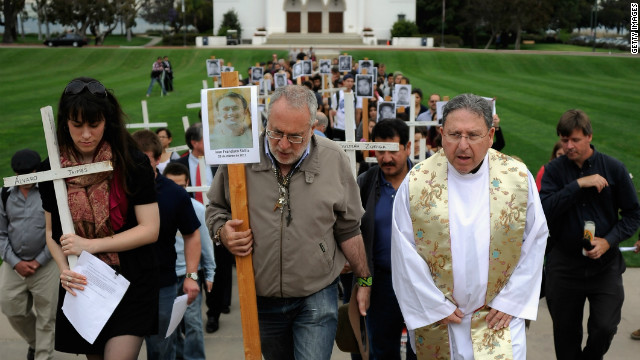 |
| Javier Sicilia leads a 50-cross procession at Loyola Marymount University, each cross representing 1,000 cartel murder victims. |
STORY HIGHLIGHTS
- Mexican poet Javier Sicilia's son and six friends were killed by drug cartel hit men
- Sicilia gave up writing and started a movement for peace and an end to war on drugs
- Sicilia: 60,000 slain since war on drugs began in 2006, with no end to drugs
- Sicilia leading a peace caravan in the U.S. to end the drug war ravaging both nations
Editor's note: Javier
Sicilia is one of Mexico's most highly regarded poets and the leader of
the Movement for Peace with Justice and Dignity. His son, Juan
Francisco, was murdered last year near his hometown of Cuernavaca. The
Movement's Caravan for Peace crossed the border at San Diego on August 12 and will arrive in Washington on September 10. Follow on Twitter @caravanaUSA
(CNN) -- Why was my son murdered? He was 24, and he
had never tried drugs. He didn't even smoke. He had paid half his
university costs with a sports scholarship and was working as
administrative staff at a cardiac clinic in Morelos, Mexico. Why then
was my son suffocated by hit men from the Gulf Cartel? Why did his six
friends, just like him, die at his side?
The answer, you may tell
me, is obvious. "Because drug traffickers are bad, and must be stopped."
The answer, however, is not that simple. If it were I would not be
leading a caravan for peace across the United States. Let's pose the
question differently. If Mexico's President Felipe Calderon had treated
drug abuse as a question of public health rather than a matter of
national security, might my son and his friends still be alive today? If
instead of declaring war on drug trafficking, Calderón had pursued a
bilateral agenda with the United States to decriminalize drugs and
regulate their use, is it possible that they and tens of thousands of
other young people killed in the last six years would be still be with
us?
Declaring a war obliges
one's enemy to build up defensive armies. And if the principal tactic of
that war is identifying and taking out crime syndicate leaders, it
leaves their decapitated, but ever profitable, organizations adrift.
President Calderon went on the offensive against cartel "capos." The
result was a proliferation of criminal gangs.
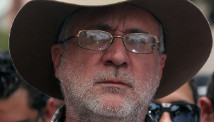
Javier Sicilia
My son, Juan Francisco,
and his friends were kidnapped, tortured and killed by one of those new
splinter gangs, who did the hit for just $25,000 and two pickup trucks.
Javier Sicilia's last poem
The world is not worthy of words
they have been suffocated from the inside
as they suffocated you, as they tore apart your lungs ...
the pain does not leave me
all that remains is a world
through the silence of the righteous,
only through your silence and my silence, Juanelo.
Dedicated to his son, Juan Francisco
Why? One of the young men
killed with my son had complained about a theft in the valet parking of
a bar that turned out to be managed by one of the criminal gangs
untethered after drug lord Beltrán Leyva was killed and his lieutenants
scattered. "Comandante H," a former Beltrán Leyva confidante, was
recently apprehended by authorities, telling his captors, "I was quite
outraged when they murdered Sicilia's son and his friends. Murdering
innocent people is not our business. Our business is drugs. But I was
fleeing, and I could not do anything."
The horrific story of my son and his friends is one of thousands like it in our country. More than 60,000 people have been killed
and 20,000 have disappeared because of the myopic war strategy Felipe
Calderon and the Mexican security forces have pursued since 2006. Some murder estimates are even higher.
That is why I stopped
writing poetry and took to the streets with thousands of other grieving
Mexicans to make my son, and other victims like him, visible. Now, I'm
traveling across the United States with members of dozens of families
broken by violence to seek common cause with Americans whose
communities, especially the African American and Latino communities who
have so warmly hosted us, that have been battered by the violence and
the criminalization that this same counterproductive war inflicts on the
U.S. side of the border.
The path of peace must
be taken by both our nations in concert. We know that President Calderón
would not have declared his war without U.S. sponsorship, money and
military advice.
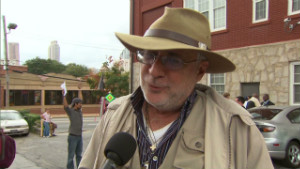 A grieving father's peace crusade
A grieving father's peace crusade
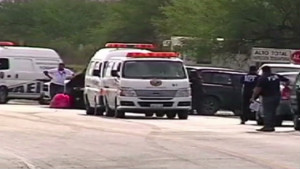 Bodies dismembered in cartel violence
Bodies dismembered in cartel violence
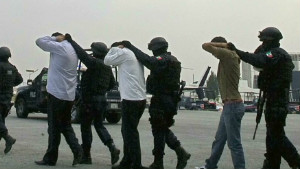 Zakaria: Mexico turning tide in drug war
Zakaria: Mexico turning tide in drug war
Drug traffickers would
not be able to fight this war without the high-powered assault weapons
which, legalized in the United States, now flood over the Mexican
border. Drug lords could not afford their wars without massive illegal
drug profits and collusion by international banks to launder their
money.
Forty-plus years after U.S. President Nixon declared the drug war, it is time to concede it hasn't worked any more than alcohol Prohibition worked back in the 1920s.
This is why, after
traveling in two caravans across Mexico and, talking twice with
President Calderon on live television, our movement of war victims
called for a caravan across the United States. We started in San Diego
on August 12th and we will end in Washington, D.C., on September 12th.
With each mile traveled, we seek to raise awareness and spur the good
conscience of the people of the United States, while reframing the
issues of war and peace on the bilateral agenda of Mexico and the United
States. We implore the governments of Mexico and of the United States
to accept co-responsibility for ending the disastrous drug war.
We've been encouraged by
the warmth and breadth of support we've experienced on our journey,
from thousands of Americans, including grieving moms who've lost their
children to drug addiction and top cops who have decided to speak out
against the destruction wrought by prohibition. Yet even as we are
carried forward by the momentum of this fresh dialogue, another voice
echoes.
Every time I close my
eyes I see my son's gaze moments before his death. He is afraid, very
afraid, and behind his fear I hear a horrible question. "If drugs were
legalized, and there were no weapons, would I be here, just about to
die? Go, dad, leave all your things behind and tell everyone that this
war is destroying more people than the drugs themselves. Tell them that
no prohibition is worth the death of any person. Go tell them that we
need to find peace, so that no other father will have to see his son die
like this, and no son will again suffer what I am suffering."
This is why we have come to the United States. If we do not make peace together, we will never find it.
Follow @CNNOpinion on Twitter.
Join us at Facebook/CNNOpinion.
The opinions expressed in this commentary are solely those of Javier Sicilia.
Tagged: peace, peacemaker, world peace, world unity, peace monuments, green, green living, peace sign, peace symbol, art, sculpture, contemporary art, news, world news, peacemaking, free peacemaker web tools, free peacemaker web app
Tagged: peace, peacemaker, world peace, world unity, peace monuments, green, green living, peace sign, peace symbol, art, sculpture, contemporary art, news, world news, peacemaking, free peacemaker web tools, free peacemaker web app
No comments:
Post a Comment